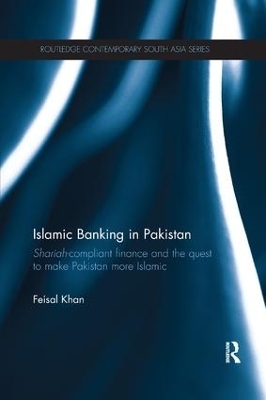
Islamic Banking in Pakistan
Shariah-Compliant Finance and the Quest to make Pakistan more Islamic
Seiten
2019
Routledge (Verlag)
978-0-367-23202-3 (ISBN)
Routledge (Verlag)
978-0-367-23202-3 (ISBN)
This book analyses the push to Islamize Pakistan and its financial system by Islamic revivalists. It offers extensive interviews with Pakistani Islamic bankers on the state of their industry and how they see it developing, and provides analysis on how the Islamic banks’ customers differ from those of conventional ones.
Islamic Banking and Finance (IBF) has become a growing force over the past three decades, with Pakistan being one of the IBF pioneers by converting to an ‘interest-free’ banking system in 1985. However, since independence in 1947, there has been continual tension over Pakistan’s essential character, between Islamic Minimalists, who favour a Modernist interpretation of Islam, and those who favour an Islamic Maximalist interpretation that sees Pakistan as a model Islamic state.
This book analyses the push to Islamize Pakistan and its financial system by Islamic revivalists, following the early 1947 debates in the original Constituent Assembly to the final 2002 ruling on IBF of the Shariat Appellate Bench of the Pakistan Supreme Court. It examines the practice and theory behind contemporary Islamic, "Shariah-compliant", banking. It offers extensive interviews with Pakistani Islamic bankers on the state of their industry and how they see it developing, and provides analysis on how the Islamic banks’ customers differ from those of conventional ones.
Presenting a critical analysis of Pakistan’s IBF experience and offering a new insight into Pakistan’s banking industry that illustrates broader political and social trends in the country, this book will be of interest to specialists on Islam, South Asia and International Economics.
Islamic Banking and Finance (IBF) has become a growing force over the past three decades, with Pakistan being one of the IBF pioneers by converting to an ‘interest-free’ banking system in 1985. However, since independence in 1947, there has been continual tension over Pakistan’s essential character, between Islamic Minimalists, who favour a Modernist interpretation of Islam, and those who favour an Islamic Maximalist interpretation that sees Pakistan as a model Islamic state.
This book analyses the push to Islamize Pakistan and its financial system by Islamic revivalists, following the early 1947 debates in the original Constituent Assembly to the final 2002 ruling on IBF of the Shariat Appellate Bench of the Pakistan Supreme Court. It examines the practice and theory behind contemporary Islamic, "Shariah-compliant", banking. It offers extensive interviews with Pakistani Islamic bankers on the state of their industry and how they see it developing, and provides analysis on how the Islamic banks’ customers differ from those of conventional ones.
Presenting a critical analysis of Pakistan’s IBF experience and offering a new insight into Pakistan’s banking industry that illustrates broader political and social trends in the country, this book will be of interest to specialists on Islam, South Asia and International Economics.
Feisal Khan is Chair of the Economics Department at Hobart and William Smith Colleges in New York, USA. He has published on economic development and corruption in Pakistan in academic journals and edited volumes.
1. Islamic Banking and Finance Worldwide 2. Muslim Nationalism, Islamic Revivalism and the Creation of Pakistan 3. Islamizing Pakistan Post-Jinnah 4. The Debate Over Riba 5. The New Orthodoxy of ‘Old’ Islamic Financial Norms 6. The ‘Nuts and Bolts’ of Islamic Banking Worldwide 7. Making Islamic Banking Even More Islamic 8. Pakistan’s ‘Rebooted’ Islamic Banking 9. Quo Vadimus, Pakistani Banking?
| Erscheinungsdatum | 20.07.2019 |
|---|---|
| Reihe/Serie | Routledge Contemporary South Asia Series |
| Zusatzinfo | 23 Tables, black and white; 34 Line drawings, black and white; 34 Illustrations, black and white |
| Verlagsort | London |
| Sprache | englisch |
| Maße | 156 x 234 mm |
| Gewicht | 362 g |
| Themenwelt | Geisteswissenschaften ► Religion / Theologie ► Islam |
| Naturwissenschaften ► Geowissenschaften ► Geografie / Kartografie | |
| Sozialwissenschaften ► Soziologie ► Spezielle Soziologien | |
| Wirtschaft ► Betriebswirtschaft / Management ► Finanzierung | |
| Betriebswirtschaft / Management ► Spezielle Betriebswirtschaftslehre ► Bankbetriebslehre | |
| ISBN-10 | 0-367-23202-2 / 0367232022 |
| ISBN-13 | 978-0-367-23202-3 / 9780367232023 |
| Zustand | Neuware |
| Haben Sie eine Frage zum Produkt? |
Mehr entdecken
aus dem Bereich
aus dem Bereich
warum unser Geld stirbt und wie Sie davon profitieren
Buch | Hardcover (2024)
FinanzBuch (Verlag)
CHF 41,95
denken und handeln wie ein professioneller Trader
Buch | Softcover (2023)
Vahlen, Franz (Verlag)
CHF 51,65


